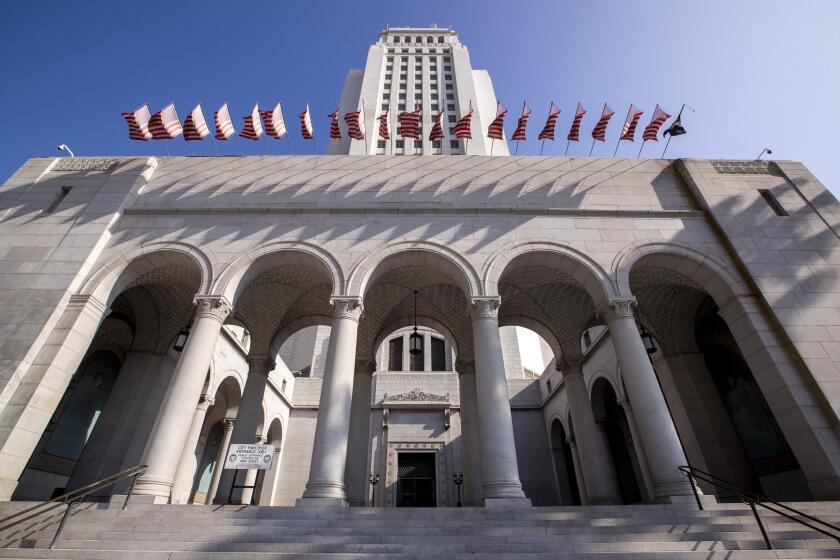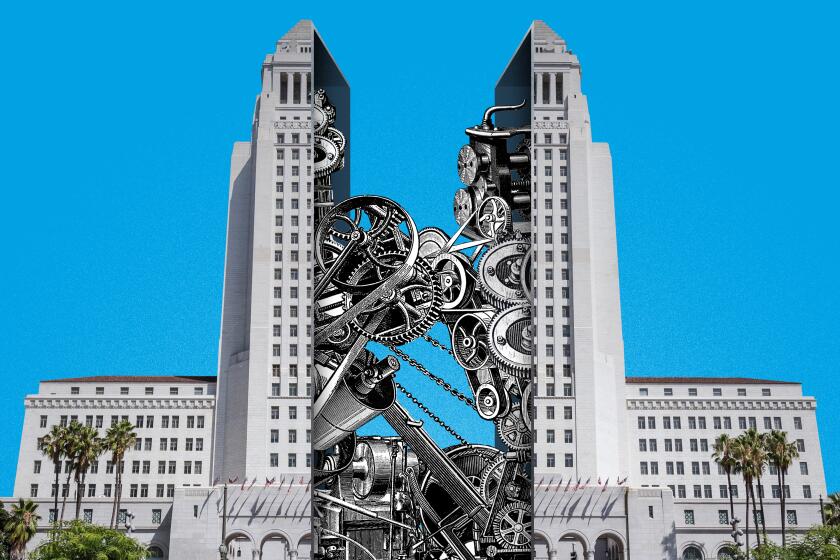A nominee to L.A. Ethics Commission raises, well, ethical questions

- Share via
Perhaps at another time the nomination of Alex Johnson to the Los Angeles Ethics Commission wouldn’t have raised eyebrows.
In general, political appointments to Los Angeles’ commissions are rarely controversial and confirmations are routine. That includes the nominations to the five-member Ethics Commission, which is the watchdog over the city’s elected officials and enforces campaign finance, contracting, lobbying and conflict of interest laws.
But last month, the City Council balked at City Controller Kenneth Mejia’s pick for the Ethics Commission, ostensibly because she previously worked as a fundraiser for political campaigns. That was cited by several council members as problematic because the commission regulates campaign finance. The nominee, Jamie York, was voted down 14-0 in a rare rejection of an appointment. Mejia hasn’t said whether he will renominate her or pick someone else.
Editorial: Why is the ethically challenged L.A. City Council obstructing the Ethics Commission?
The behind-the-scenes effort to kill an appointment to the city’s oversight panel shows just how much L.A. needs political and ethics reforms.
Then, last week, Councilmember Marqueece Harris-Dawson nominated Johnson, who is a vice president at Bryson Gillette, a political consulting and public affairs firm that works with candidates running for city and school board offices. Filings show the firm has handled more than $2 million worth of work for various political campaigns since May 2020, including an independent expenditure committee for the Los Angeles County Federation of Labor, Times reporters Dakota Smith and Julia Wick wrote.
There is nothing in the City Charter that would bar Johnson from serving. To his credit, he said he’s already consulted with the city attorney’s office and commission staff about how to address conflicts that might arise with his firm and its clients, and would “exercise all due diligence and recuse myself as necessary.”
Still, when his nomination comes to the council for a confirmation vote it ought to raise just as much scrutiny as the last nominee because of the larger questions about the independence of the city’s political watchdog and how to restore public trust in government after a series of public corruption scandals.
Fixing City Hall
Los Angeles City Hall has been rocked by scandal after scandal, but now there’s momentum to reform city government.
Should a person employed by a firm that works on campaigns regulated by the Ethics Commission be serving on the Ethics Commission? Ideally, no.
In a city of 4 million people, surely there are more than a few people who can make wise judgments on ethics policies and enforcement and who do not have a potential conflict of interest. The problem isn’t that such people don’t exist — it’s that they don’t get nominated. Elected officials are generally looking for like-minded allies who have experience with and perhaps sympathy for those navigating ethics regulations, and who may not seek the toughest reforms. (More than her past fundraising work, York’s rejection was probably driven by her push for stronger lobbying and campaign finance rules.)
The Ethics Commission’s size and composition are essential to reform and should be on the agenda in City Hall. Other cities, including Oakland and Long Beach, reserve some ethics commission seats for nonpolitical appointments who are not chosen or confirmed by the people they regulate. And some have set qualifications for political appointees, such as experience working in local governance, public policy, campaign finance or the protection of whistleblowers. Those appointees then pick the remaining members from citizen applications. That creates a broader pool of candidates from outside the City Hall network, and potentially a more independent commission.
As of now, the Ethics Commission remains unable to conduct its business. The commission canceled its August meeting and cannot decide enforcement cases or move forward policy proposals because of three vacancies on the five-member board. If Johnson is appointed, the commission can finally begin to meet again. Whatever the council decides on Johnson, the bigger problem remains — L.A. needs a stronger, more independent Ethics Commission, and it’s going to take political will and voter approval to make it happen.
More to Read
A cure for the common opinion
Get thought-provoking perspectives with our weekly newsletter.
You may occasionally receive promotional content from the Los Angeles Times.











